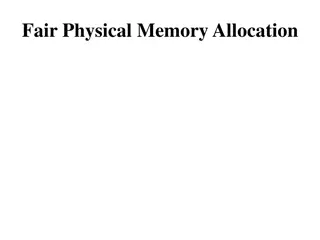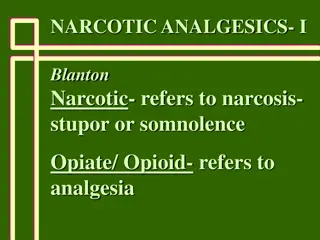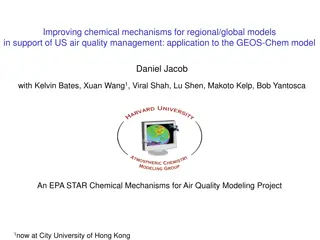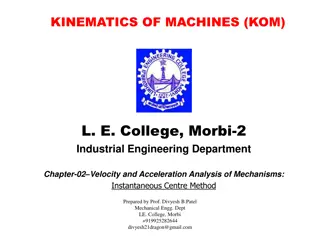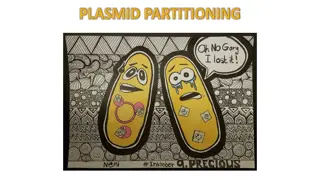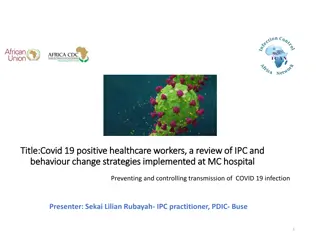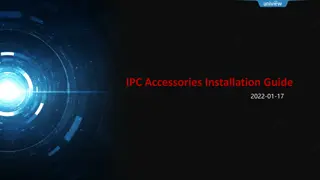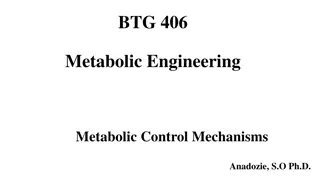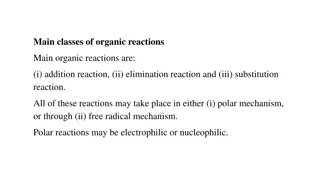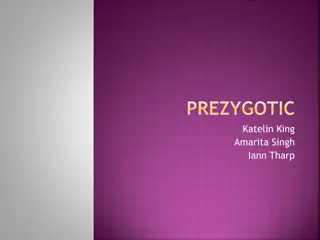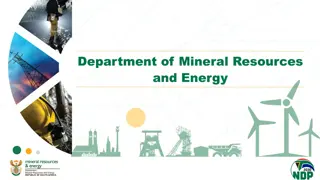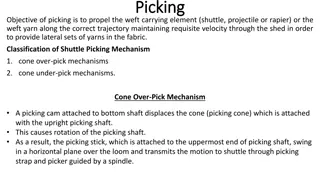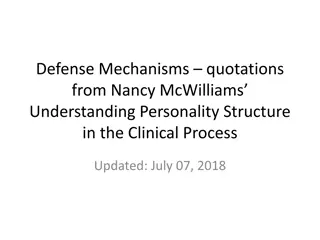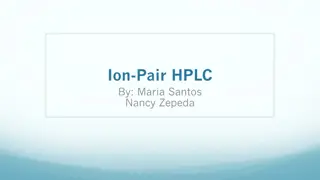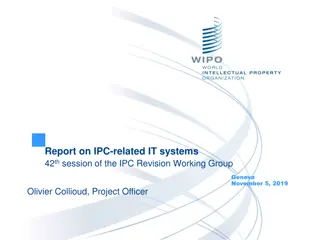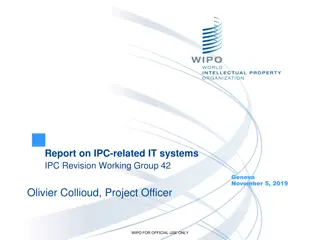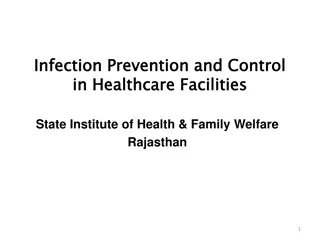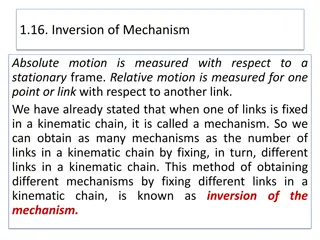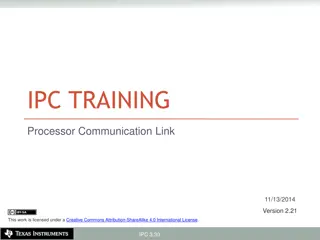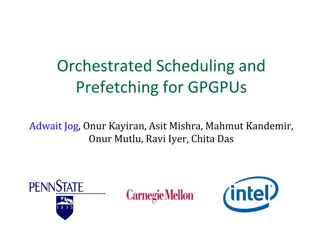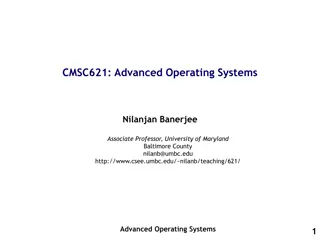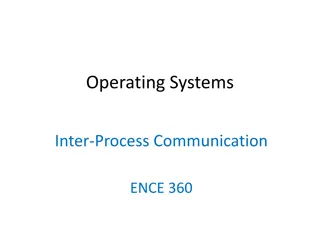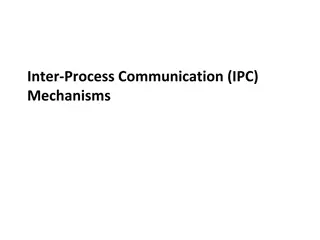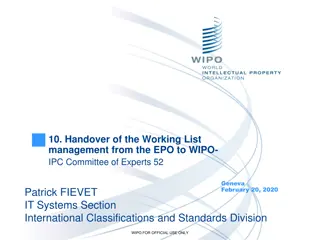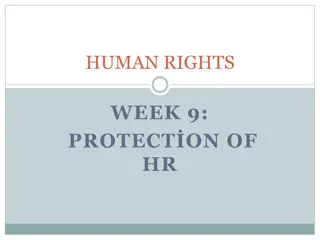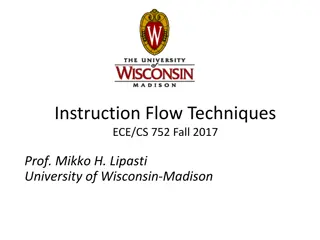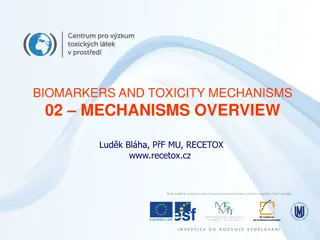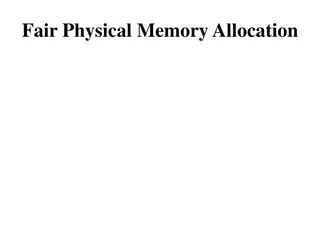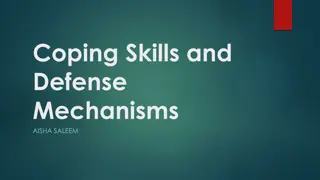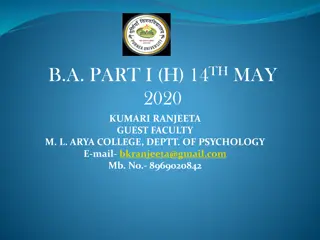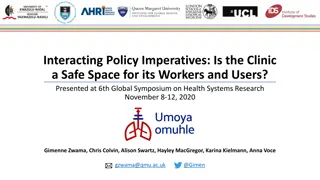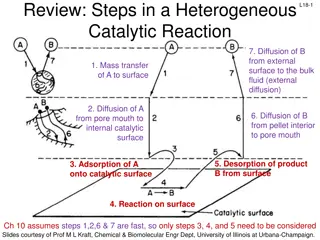Understanding Memory Allocation in Operating Systems
Memory allocation in operating systems involves fair distribution of physical memory among running processes. The memory management subsystem ensures each process gets its fair share. Shared virtual memory and the efficient use of resources like dynamic libraries contribute to better memory utilizat
1 views • 233 slides
Understanding Narcotic Analgesics and Opiates: History, Mechanisms, and Uses
Delve into the world of narcotic analgesics and opiates, exploring the history of opium poppy, morphine derivatives, opioid compounds, and the pharmacology mechanisms of action. Discover the uses of opiates in analgesia, preanesthetic medication, and more, alongside the endogenous ligands involved.
8 views • 55 slides
Advancements in Chemical Mechanisms for Air Quality Management
Daniel Jacob and team have been enhancing chemical mechanisms in the GEOS-Chem model to support US air quality management. Ongoing work includes developing new mechanisms for aromatic VOCs, tropospheric halogens, mercury redox, adaptive mechanism reduction, machine learning applications, and unifica
0 views • 19 slides
Kinematics of Machines: Instantaneous Center Method for Velocity and Acceleration Analysis
Explore the method of locating instantaneous centers in mechanisms to analyze velocity and acceleration. The content covers examples of pin-jointed four-bar mechanisms and slider-crank mechanisms, providing dimensions and angular velocities calculations. Prof. Divyesh B. Patel from L.E. College, Mor
0 views • 13 slides
Understanding Plasmid Partitioning Mechanisms in Bacteria
The stable maintenance of low-copy-number plasmids in bacteria relies on partition mechanisms that ensure proper positioning during cell division. Different from high-copy-number plasmids, which rely on random diffusion, low-copy-number plasmids require regulated partitioning mechanisms to prevent d
0 views • 14 slides
IPC and Behavior Change Strategies for COVID-19 Positive Healthcare Workers at MC Hospital
This review discusses the implementation of infection prevention and control (IPC) measures and behavior change strategies for COVID-19 positive healthcare workers at MC Hospital. The presentation outlines the introduction of the hospital, COVID-19 positive staff statistics, IPC strategies, outcomes
0 views • 22 slides
IPC Accessories Installation Guide 2022 - Camera Mounts & Electric Box Plates
In this Installation Guide, you will find detailed instructions for installing various types of camera mounts, including Box Camera mounts, Dome Camera mounts, and Electric Box Transfer plates for different IPC series. The guide covers indoor and outdoor installations, wall mounts, pole mounts, ceil
0 views • 22 slides
Enhancing Infection Prevention and Control in Ghana's Health Facilities
The Ghana Health Service, under the leadership of Dr. Samuel Kaba Akoriyea, has implemented initiatives to strengthen infection prevention and control (IPC) in healthcare facilities. This includes training programs for health staff, development of national technical guidelines, and establishment of
1 views • 4 slides
Understanding Metabolic Control Mechanisms in Cellular Regulation
Metabolic control mechanisms play a crucial role in maintaining homeostasis within cells by regulating metabolic pathways. This involves finely adjusting the output of pathways in response to external signals, ensuring the proper flux of metabolites to meet cellular needs. Pacemaker enzymes, such as
0 views • 17 slides
Overview of Organic Reactions and Mechanisms
Organic reactions can be categorized into addition, elimination, and substitution reactions, occurring through either polar or free radical mechanisms. Polar reactions may be electrophilic or nucleophilic, while free radical reactions involve radicals reacting to complete electron octets. Different
2 views • 26 slides
Understanding Prezygotic Reproductive Isolating Mechanisms
Prezygotic reproductive isolating mechanisms prevent mating or fertilization between different species before it can occur. Examples include habitat isolation, behavioral isolation, and temporal isolation. These mechanisms play a significant role in maintaining species integrity and preventing the f
0 views • 4 slides
Fuel Pricing Mechanisms and Regulatory Framework Presentation
This presentation to the Portfolio Committee on Mineral Resources and Energy delves into the Basic Fuel Price (BFP) for liquid fuels, covering global fuel pricing forms, policy positions, key pricing mechanisms, regulatory mandates, and the intricate structure behind fuel prices. It explains how the
2 views • 28 slides
Development of Indian Penal Code (IPC) 1860 and Its Impact in British India
The Indian Penal Code (IPC) of 1860 was introduced in British India after a series of historical events led to the need for a comprehensive criminal justice system. The disintegration of the Mughal Empire paved the way for British takeover, resulting in variations in criminal laws across different B
1 views • 24 slides
Understanding Shuttle Picking Mechanisms in Weaving
Shuttle picking mechanisms play a crucial role in propelling the weft carrying element to maintain the required trajectory and velocity in fabric weaving. Two common mechanisms are cone over-pick and cone under-pick, each offering unique adjustments for strength and timing. The cone over-pick involv
0 views • 14 slides
Exploring Defense Mechanisms in Personality Structure
In "Understanding Personality Structure in the Clinical Process" by Nancy McWilliams, various defense mechanisms are illustrated through real-life examples. These mechanisms include primitive withdrawal, denial, omnipotent control, idealization and devaluation, and projection with projective identif
1 views • 29 slides
Understanding Ion-Pair Chromatography (IPC): Theory and Applications
Ion-Pair Chromatography (IPC) involves adding ionic surfactants to a reversed-phase Chromatography system to affect retention and selectivity of ionic compounds. Developed by Dr. Gordon Schill, IPC is crucial for resolving hydrophilic samples and controlling selectivity in separations. The theory in
6 views • 18 slides
Overview of IPC-Related IT Systems at the 42nd IPC Revision Working Group Session
Detailed report on IPC-related IT systems discussed during the 42nd session of the IPC Revision Working Group in Geneva, covering topics such as IPCPUB agenda, IPCWLMS project updates, IPC reclassification backlog, IPC-IEF integration into IPCRMS, and IT operations/support for IPC.
0 views • 10 slides
Overview of IPC-Related IT Systems & Projects in Geneva 2019
Highlighting the activities of the IPC Revision Working Group 42 in Geneva on November 5, 2019, this report by Olivier Collioud, a Project Officer at WIPO, focuses on various IT systems and projects related to the International Patent Classification (IPC). It covers updates on IPCPUB, IPCWLM, IPCREC
0 views • 10 slides
Comprehensive Guide to Infection Prevention and Control in Healthcare Facilities
This comprehensive guide outlines the objectives, structure, responsibilities, common sources of infection, and principles of infection prevention and control in healthcare facilities. The program aims to minimize the risk of healthcare-associated infections, enhance healthcare worker adherence to I
0 views • 55 slides
Understanding the Inversion of Mechanisms in Kinematics
Inversion of Mechanisms in Kinematics involves measuring absolute and relative motions in stationary and moving frames, respectively. By fixing different links in a kinematic chain, we can obtain various mechanisms. This process does not alter relative motions but may significantly change absolute m
0 views • 78 slides
Overview of Inter-Processor Communication (IPC) in Processor Communication Link
Overview of Inter-Processor Communication (IPC) entails communication between processors, synchronization methods, and supported device types. The IPC architecture supports diverse use cases with various thread combinations and messaging types, catering to multi- or uni-processor environments. The A
0 views • 110 slides
Understanding Interprocess Communication in Operating Systems
Interprocess communication (IPC) is essential for processes within a system to cooperate and share information. IPC facilitates message passing and shared memory, enabling processes to communicate and synchronize their actions effectively. This article explores the different models of IPC, such as m
0 views • 18 slides
Orchestrated Scheduling and Prefetching for GPGPUs
This paper discusses the implementation of an orchestrated scheduling and prefetching mechanism for GPGPUs to enhance system performance by improving IPC and overall warp scheduling policies. It presents a prefetch-aware warp scheduler proposal aiming to make a simple prefetcher more capable, result
0 views • 46 slides
Safeguarding Focal Point Training: Enhancing Reporting and Response Mechanisms
This training module focuses on empowering Safeguarding Focal Points (SFPs) to understand and implement community-based feedback and response mechanisms, effectively handle safeguarding complaints, document barriers to reporting, address data protection issues, and ensure inclusive and confidential
0 views • 18 slides
Understanding Authentication Mechanisms and Security Vulnerabilities
Authentication lies at the core of application security, serving as the primary defense against malicious attacks. This article explores various authentication technologies, including HTML forms-based authentication, multi-factor mechanisms, client SSL certificates, and more. It delves into common d
0 views • 70 slides
Understanding Classical Inter-Process Communication Problems
Classical Inter-Process Communication (IPC) problems such as the Dining Philosophers Problem and the Readers and Writers Problem are explored in-depth by Ali Akbar Mohammadi. The challenges, solutions, and non-solutions to these problems are discussed, shedding light on issues like starvation in con
0 views • 15 slides
Understanding Advanced Operating Systems Concepts with Professor Banerjee
Learn about the foundational concepts of Distributed Systems, Processes, Inter-process communication, and more in the Advanced Operating Systems course taught by Associate Professor Nilanjan Banerjee at the University of Maryland Baltimore County. Explore topics such as process execution, memory man
0 views • 20 slides
Understanding Inter-Process Communication in Operating Systems
Exploring the concept of Inter-Process Communication (IPC) in operating systems, this content delves into how processes cooperate, different IPC paradigms like message passing and shared memory, examples of cooperating processes, and the challenges and advantages of process cooperation. It also addr
0 views • 29 slides
Carnegie Mellon Inter-Process Communication Mechanisms
Carnegie Mellon Inter-Process Communication (IPC) mechanisms enable communication between processes living in different memory address spaces. This involves cooperating processes needing data transfer, resource sharing, event notification, and process control. IPC methods include Pipes, Shared Memor
0 views • 78 slides
Handover of Working List Management: IPC Committee of Experts Meeting Overview
The handover of the working list management from the EPO to WIPO-IPC Committee of Experts in Geneva in February 2020 is discussed, showcasing the status, highlights of IPCWLMS, distribution details, and reference documentation for the transition from IPCRECLASS to IPCWLMS. The presentation emphasize
0 views • 14 slides
Global Internet Governance: ICANN Presentation to WIPO Standing Committee
Mark Carvell, the UK Representative to WIPO, presented on ICANN's structure, processes for IP rights protection, and upcoming meetings with the Governmental Advisory Committee. Key points included the role of ICANN in policy implementation, the involvement of stakeholder groups like IPC, and ongoing
0 views • 5 slides
Overview of Human Rights Monitoring Mechanisms
Human rights conventions under the United Nations and regional systems have established monitoring mechanisms to ensure compliance. These mechanisms include treaty-based and non-treaty-based approaches, with treaty bodies overseeing the implementation of legally binding instruments. Reporting proced
0 views • 23 slides
Improved Truthful Mechanisms for Subadditive Combinatorial Auctions
This research paper discusses strategies to maximize welfare in combinatorial auctions. It explores mechanisms for handling strategic bidders with private valuations, aiming to design truthful and optimal welfare mechanisms while considering polytime constraints. The study presents advancements in a
0 views • 19 slides
Understanding Instruction Flow Techniques in High-IPC Processors
Explore the intricate processes involved in optimizing instruction flow within high-IPC processors, tackling challenges such as control dependences, branch speculation, and branch direction prediction. Learn about the goals, impediments, branch types, and implementations that shape the efficient exe
0 views • 80 slides
Understanding Biomarkers and Toxicity Mechanisms: Overview of Mechanisms in Targeting Biological Macromolecules
This overview delves into different categorizations of mechanisms of action (MoA) based on target molecules, interaction types, and steric specificity. It explores non-specific and specific mechanisms, along with possible categorizations involving membrane toxicity, reactive toxicity, and species-sp
0 views • 8 slides
Understanding Linux Virtual Memory Management
The memory management subsystem in Linux ensures fair physical memory allocation for running processes, allowing them to share virtual memory when needed. Processes can have separate virtual address spaces or share memory through mechanisms like Unix System V shared memory IPC. Linux uses an abstrac
0 views • 230 slides
Understanding Coping Skills and Defense Mechanisms
Coping mechanisms and defense mechanisms are strategies individuals use to manage stress and emotions. Coping mechanisms help people adjust to difficult events while maintaining emotional well-being, whereas defense mechanisms operate at an unconscious level and can change internal psychological sta
0 views • 18 slides
Defense Mechanisms in Psychology: Understanding Repression, Displacement, Intellectualization, Rationalization
Defense mechanisms play a crucial role in how individuals cope with stress and anxiety. This text delves into key defense mechanisms such as repression, displacement, intellectualization, and rationalization. These mechanisms help individuals manage unacceptable thoughts, feelings, and impulses by r
0 views • 11 slides
Enhancing Clinic Safety: Interplay Between Ideal Clinic Initiative and TB-IPC Policy Imperatives
The Ideal Clinic Initiative (ICI) in South Africa aims to improve health system quality by addressing operational challenges. This study explores the interaction between ICI components and TB infection prevention and control (TB-IPC) measures in primary health care facilities. Findings reveal compro
0 views • 6 slides
Understanding Steps in Heterogeneous Catalytic Reactions and Adsorption Mechanisms
This review discusses the steps involved in a heterogeneous catalytic reaction, focusing on diffusion, mass transfer, adsorption, and desorption processes. It details the site balance, surface reaction mechanisms, and desorption steps, providing insights into the complexities of catalytic processes.
0 views • 17 slides
